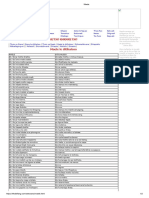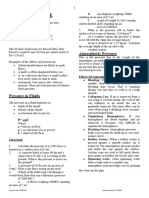0 ratings0% found this document useful (0 votes)
8 viewsGlobalisation 2
Globalisation 2
Uploaded by
wengiemotshegweGlobalization has led to increased worldwide competition between businesses. As trade barriers fall with formations like the SADC and SACU, businesses face more foreign competition and less government protections. Changing exchange rates also impact businesses, with currency appreciation buying more and depreciation buying less of other currencies. While free trade increases market share and access to cheaper imported goods, it also brings disadvantages like competition and potential job losses from imports.
Copyright:
© All Rights Reserved
Available Formats
Download as ODP, PDF, TXT or read online from Scribd
Globalisation 2
Globalisation 2
Uploaded by
wengiemotshegwe0 ratings0% found this document useful (0 votes)
8 views11 pagesGlobalization has led to increased worldwide competition between businesses. As trade barriers fall with formations like the SADC and SACU, businesses face more foreign competition and less government protections. Changing exchange rates also impact businesses, with currency appreciation buying more and depreciation buying less of other currencies. While free trade increases market share and access to cheaper imported goods, it also brings disadvantages like competition and potential job losses from imports.
Original Title
GLOBALISATION 2
Copyright
© © All Rights Reserved
Available Formats
ODP, PDF, TXT or read online from Scribd
Share this document
Did you find this document useful?
Is this content inappropriate?
Globalization has led to increased worldwide competition between businesses. As trade barriers fall with formations like the SADC and SACU, businesses face more foreign competition and less government protections. Changing exchange rates also impact businesses, with currency appreciation buying more and depreciation buying less of other currencies. While free trade increases market share and access to cheaper imported goods, it also brings disadvantages like competition and potential job losses from imports.
Copyright:
© All Rights Reserved
Available Formats
Download as ODP, PDF, TXT or read online from Scribd
Download as odp, pdf, or txt
0 ratings0% found this document useful (0 votes)
8 views11 pagesGlobalisation 2
Globalisation 2
Uploaded by
wengiemotshegweGlobalization has led to increased worldwide competition between businesses. As trade barriers fall with formations like the SADC and SACU, businesses face more foreign competition and less government protections. Changing exchange rates also impact businesses, with currency appreciation buying more and depreciation buying less of other currencies. While free trade increases market share and access to cheaper imported goods, it also brings disadvantages like competition and potential job losses from imports.
Copyright:
© All Rights Reserved
Available Formats
Download as ODP, PDF, TXT or read online from Scribd
Download as odp, pdf, or txt
You are on page 1of 11
GLOBALISATION
The increase in worldwide competition between business.
HOW BUSINESSES ARE AFFECTED BY
INTERNATIONAL COMMUNITY
• More competition from foreign firms- as the are many businesses from
other countries that will be providing the same service or the same
product. Hence, less customers that will buy the product leading to
less sales.
• No government protection- as the government cannot provide loans,
tax credits and tax deductions. Hence they can be strained by higher
currencies
•
EXCHANGE RATE
• The price of one currency in terms of another.
HOW BUSINESS CAN BE AFFECTED BY
CHANGING EXCHANGE RATE
• APPRECIATION-it occurs when the value of a currency arises. It
buys more of another currency than before.
•
• DEPRECIATION-it occurs when the value of a currency falls. It buys
less of another currency that before.
CURRENT EXCHANGE RATE
BARRIERS TO TRADE
• LANGUAGE- different countries uses different languages some of
which being a business owner, one might not be aware of them. This
leads to difficulty to trade amongst the customers and producers.
• Different currencies- when one sells at a different country the
currencies might be higher than the other which makes it expensive
for the business. Hence high sales
• Strict laws- a country might set legal price limits on products to
protect customers. Hence lower prices leads to lower profits made by
the business.
FORMATION OF FREE TRADE
ASSOCIATIONS
• This is reducing barriers and limits on international trade.
• E.g. SADC, SACU
• They even share or use sea ports for free
•
ADVANTAGES OF FREE TRADE
• Increases market share- as there are many people who can buy the
products
• Easy to export-as there are no barriers and no charges when selling
goods btwn countries.
• Cheaper goods- as there are low or no charge when exporting goods
DISADVANTAGES OF FREE TRADE
• Competition from imported foreign goods- as better goods may be
imported into the country leading to low demand.
• Leads to loss of jobs-
ADVANTAGES OFGLOBALISATION
• Cheaper goods- as there is higher competition, businesses reduce
prices to increase customers willing to buy the goods.
• Large market share- there are many people to buy the goods than just
within the countries.
• Easy access to raw materials- as a business can acquire the raw
materials from other countries
• High quality goods produced- due to profit motive of the businesses,
quality is ensured so as to meet consumer needs and satisfaction.
•
DISADVANTAGES
• Loss of skilled manpower-
• may increase dumping of poor quality goods to less developed
countries- as they want to make profit, they will produce more goods
compromising the quality and then send it to under developed
countries to maximise profits. Hence minimum satisfaction of
customers from the under developed countries.
• Increased competition- as there are many businesses that sell the same
product from different countries some of which are developed and
they will produce goods of better quality. Hence low sales of the
goods.
You might also like
- Maele Le DitlhalosoDocument2 pagesMaele Le Ditlhalosowengiemotshegwe100% (10)
- MaeleDocument2 pagesMaelewengiemotshegwe75% (4)
- Managerial Economics: Koç University Graduate School of Business MGEC 501 Levent KoçkesenDocument9 pagesManagerial Economics: Koç University Graduate School of Business MGEC 501 Levent KoçkesenJen MattNo ratings yet
- Porter's Five Forces and SWOT: Retail IndustryDocument38 pagesPorter's Five Forces and SWOT: Retail Industryvintosh_pNo ratings yet
- Business and The International EconomyDocument4 pagesBusiness and The International EconomyMaro HalawanyNo ratings yet
- Ibt ReviewerDocument9 pagesIbt ReviewertutanesjeremaeNo ratings yet
- International Trade NotesDocument12 pagesInternational Trade NotesTaelor FergusonNo ratings yet
- CH 37 Free Trade and ProtectionDocument7 pagesCH 37 Free Trade and Protectionvalopls123No ratings yet
- International Marketing C6Document34 pagesInternational Marketing C6Huyền DiệuNo ratings yet
- Business & International Economy IGCSE Business NotesDocument5 pagesBusiness & International Economy IGCSE Business NotesHiNo ratings yet
- The Globalization of Markets and BrandsDocument35 pagesThe Globalization of Markets and BrandsanashussainNo ratings yet
- International Trade & Investment TheoriesDocument18 pagesInternational Trade & Investment TheoriesgondalsNo ratings yet
- IB Economics SL13 - International TradeDocument7 pagesIB Economics SL13 - International TradeTerran100% (2)
- 01 AE13 Why Study Financial MarketsDocument29 pages01 AE13 Why Study Financial MarketsLeojelaineIgcoyNo ratings yet
- It 1 Bba Ii & Bcom IiDocument115 pagesIt 1 Bba Ii & Bcom IiArmaan AliNo ratings yet
- Fundamental Principles of The International Trade Law PPDocument15 pagesFundamental Principles of The International Trade Law PPPRAKRITI SITOULANo ratings yet
- International PricingDocument33 pagesInternational Pricingarvind_pathak_4No ratings yet
- Ibm Chapter OneDocument35 pagesIbm Chapter OnemistereNo ratings yet
- International TradeDocument13 pagesInternational TradeFiona UsherNo ratings yet
- 78603Document30 pages78603oduor wanenoNo ratings yet
- LECTURE 5 Trade and Factor Mobility TheoryDocument39 pagesLECTURE 5 Trade and Factor Mobility TheoryAllen DizonNo ratings yet
- International TradeDocument23 pagesInternational TradeM Rheza Rizqiaputra100% (2)
- Advantages and Disadvantages of International TradeDocument3 pagesAdvantages and Disadvantages of International TradeSiva SrinivasanNo ratings yet
- Module 1.2 - Rise of GlobalizationDocument12 pagesModule 1.2 - Rise of GlobalizationGerald RamiloNo ratings yet
- International TradeDocument51 pagesInternational Tradeskjoshi.igkvNo ratings yet
- Week 7 International Pricing ConsideratDocument27 pagesWeek 7 International Pricing ConsideratSafridNo ratings yet
- IBF Ch2Document59 pagesIBF Ch2meka mehdeNo ratings yet
- IGCSE COMMERCE Chapter 6.1 PDFDocument4 pagesIGCSE COMMERCE Chapter 6.1 PDFTahmid RaihanNo ratings yet
- Industrial Business Module 2Document43 pagesIndustrial Business Module 2Deepa G N Binesh CNo ratings yet
- Determinants of DemandDocument32 pagesDeterminants of DemandNaeem HaiderNo ratings yet
- Grp06 S02 - Imperfect Competition Q1 V02Document2 pagesGrp06 S02 - Imperfect Competition Q1 V02api-3695734No ratings yet
- Financial Dimensions of Pricing in International Business StrategiesDocument15 pagesFinancial Dimensions of Pricing in International Business StrategiesMarianne Mae CatapangNo ratings yet
- GCE Business Globalisation and International Marketing-CompletedDocument16 pagesGCE Business Globalisation and International Marketing-CompletedChand BhewaNo ratings yet
- KTQT - ST Slide - Week 3 - Chapter 4+5 - Tariffs & Nontariff BarriersDocument46 pagesKTQT - ST Slide - Week 3 - Chapter 4+5 - Tariffs & Nontariff BarriersProggie TaetaeNo ratings yet
- 6.2 Globalisation and TradeDocument36 pages6.2 Globalisation and Tradezainabwaqas2007No ratings yet
- DR Nisha Tatkar: NET, PH.D (Banking & Finance)Document39 pagesDR Nisha Tatkar: NET, PH.D (Banking & Finance)sagarNo ratings yet
- International PricingDocument22 pagesInternational PricingAnonymous d3CGBMzNo ratings yet
- The Competitive EnvironmentDocument11 pagesThe Competitive Environmentsk001No ratings yet
- Chapter 8Document34 pagesChapter 8JP ONo ratings yet
- Wto and Anti-Dumping MeasuresDocument7 pagesWto and Anti-Dumping MeasuresDheeraj GowdaNo ratings yet
- 4 International Economy of UgandaDocument40 pages4 International Economy of UgandaPule JackobNo ratings yet
- International Trade and GlobalisationDocument15 pagesInternational Trade and GlobalisationAlexandra UY-TIOCONo ratings yet
- Global Business Management Marketing Strategy - Part 3 Bba - VDocument40 pagesGlobal Business Management Marketing Strategy - Part 3 Bba - VSHAMRAIZKHANNo ratings yet
- International TradeDocument12 pagesInternational TradeshivaniguptaNo ratings yet
- International Trade TheoryDocument29 pagesInternational Trade Theorydeklerkkimberey45No ratings yet
- International Business and TradeDocument9 pagesInternational Business and Trademinejasminejas.17No ratings yet
- Business Unit 1 Test - StudyingDocument6 pagesBusiness Unit 1 Test - Studyingmahersandy08No ratings yet
- Lesson 19 International TradeDocument31 pagesLesson 19 International TradeJohn Christopher Verdejo RamirezNo ratings yet
- Demand and SupplyDocument21 pagesDemand and Supplyhoward.leeNo ratings yet
- International Business: Class XI Business Studies Chapter 11 International Business Revision NotesDocument17 pagesInternational Business: Class XI Business Studies Chapter 11 International Business Revision NotesRakesh AgarwalNo ratings yet
- International Pricing StrategiesDocument19 pagesInternational Pricing StrategiesshailuNo ratings yet
- Unit 9Document24 pagesUnit 9Boom SquadNo ratings yet
- Part 1.C - InternationalDocument21 pagesPart 1.C - InternationalzhengcunzhangNo ratings yet
- Marketing Notes 3.1.Document23 pagesMarketing Notes 3.1.Muhammed HabibNo ratings yet
- Chapter 21 - GloblizationDocument39 pagesChapter 21 - GloblizationAhmed WahidNo ratings yet
- ProvogueDocument14 pagesProvogueNaved IrfanNo ratings yet
- Forces in TradeDocument28 pagesForces in TradeDwight Jenna de MesaNo ratings yet
- Cirque Du SoleilDocument1 pageCirque Du SoleilalexgiioNo ratings yet
- Global Marketing Strategies: by Kumar Sudesh Imp 3 SemesterDocument26 pagesGlobal Marketing Strategies: by Kumar Sudesh Imp 3 Semestersudesh.manipal12No ratings yet
- IM Group 3 Tyler AbrasivesDocument7 pagesIM Group 3 Tyler AbrasivesTejas ShahNo ratings yet
- CHAPTER 12 ECON DEVDocument8 pagesCHAPTER 12 ECON DEVNicole TercianoNo ratings yet
- Smooth Sailing: A Quick Guide to Effective Cargo Import and Export: Logistics, #1From EverandSmooth Sailing: A Quick Guide to Effective Cargo Import and Export: Logistics, #1No ratings yet
- Parts of The EyeDocument9 pagesParts of The EyewengiemotshegweNo ratings yet
- (H2 Bio) Chapter 1 Cell BiologyDocument29 pages(H2 Bio) Chapter 1 Cell BiologywengiemotshegweNo ratings yet
- GP6 - Pressure 1Document3 pagesGP6 - Pressure 1wengiemotshegweNo ratings yet
- TP5 - Heat Capacity & Latent Heat 1Document5 pagesTP5 - Heat Capacity & Latent Heat 1wengiemotshegweNo ratings yet
- GP5 - Energy, Work & Power 1Document8 pagesGP5 - Energy, Work & Power 1wengiemotshegweNo ratings yet
- TP1 - Kinetic Theory of Matter 1Document2 pagesTP1 - Kinetic Theory of Matter 1wengiemotshegweNo ratings yet
- Diane Ka Ga Botsalano - Iafrika - SetswanaDocument1 pageDiane Ka Ga Botsalano - Iafrika - SetswanawengiemotshegweNo ratings yet
- Lesson 1 MONETARY POLICYDocument4 pagesLesson 1 MONETARY POLICYStephane Jade LapacNo ratings yet
- Module 1Document28 pagesModule 1Ayanna Camero100% (1)
- Construction Resume 2Document1 pageConstruction Resume 2api-286230576No ratings yet
- Chola 230515 114142Document7 pagesChola 230515 114142Prashanth G.P.No ratings yet
- 22 ND March Option Chain - NSE IndiaDocument1 page22 ND March Option Chain - NSE IndianitishNo ratings yet
- العراقDocument2 pagesالعراقAimen NekkacheNo ratings yet
- Time Value of MoneyDocument28 pagesTime Value of MoneyJanzel SantillanNo ratings yet
- Analisis Eksternalitas Dan Willingness To Accept TPST BantargebangDocument11 pagesAnalisis Eksternalitas Dan Willingness To Accept TPST BantargebangRima Amalia100% (1)
- Nasdaq Dozen 2016Document2 pagesNasdaq Dozen 2016api-341642564No ratings yet
- Additional DocumentsDocument14 pagesAdditional DocumentsOwen SteenkampNo ratings yet
- Understanding Politics Laws EconomicsDocument9 pagesUnderstanding Politics Laws EconomicsTong Yuen ShunNo ratings yet
- Variable Life Insurance: Anniversary StatementDocument3 pagesVariable Life Insurance: Anniversary StatementKim RamosNo ratings yet
- TCW-Module-3-Market-Integration 1Document8 pagesTCW-Module-3-Market-Integration 1Jazmine Cleobell B. LaynoNo ratings yet
- Ey The Rise of The Sharing Economy PDFDocument36 pagesEy The Rise of The Sharing Economy PDFEvelin Vonsz100% (1)
- Multiple Choice Questions and Answers On Globalisation and The Indian EconomyDocument3 pagesMultiple Choice Questions and Answers On Globalisation and The Indian EconomyAbhilash100% (1)
- Blue Moon Diamond Holding Pty LTD - 01 - SignedDocument1 pageBlue Moon Diamond Holding Pty LTD - 01 - SignedAnushree PawanrajNo ratings yet
- Lec 5 IB Chapter 2 - National Differences in Political, Economic and Legal SystemsDocument11 pagesLec 5 IB Chapter 2 - National Differences in Political, Economic and Legal SystemsusamaNo ratings yet
- Annual Report 2016 enDocument22 pagesAnnual Report 2016 enCarlos Saavedra LopezNo ratings yet
- SENSEXDocument10 pagesSENSEXMohamed ImranNo ratings yet
- Edoc BankAccounts Feb142018Document5 pagesEdoc BankAccounts Feb142018dduenogNo ratings yet
- Mannheim EMBA Payment Information March 19Document1 pageMannheim EMBA Payment Information March 19Leonardo CatalanoNo ratings yet
- Tech SpotlightDocument18 pagesTech SpotlightJNo ratings yet
- Geoeconomics: Col. John F. Troxell, U.S. Army, RetiredDocument20 pagesGeoeconomics: Col. John F. Troxell, U.S. Army, RetiredCristian PreducaNo ratings yet
- c2243 - d2890 The New Palgrave Dictionary of Economics 2018Document648 pagesc2243 - d2890 The New Palgrave Dictionary of Economics 2018Johnny Castillo SerapionNo ratings yet
- Lecture 2 Theory of DemandDocument18 pagesLecture 2 Theory of DemandDevyansh GuptaNo ratings yet
- Evaluasi Kebijakan Pengelolaan Sampah Di Tpa Gunung Panggung Kabupaten Tuban Agung Prasetya Mayangkara, ST Sekretariat Pemkab. TubanDocument18 pagesEvaluasi Kebijakan Pengelolaan Sampah Di Tpa Gunung Panggung Kabupaten Tuban Agung Prasetya Mayangkara, ST Sekretariat Pemkab. TubanRoniNo ratings yet
- Class 10 SST - Docx Test 2Document5 pagesClass 10 SST - Docx Test 2Yash AggarwalNo ratings yet
- Books On Money & Finance That Have Changed My LifeDocument19 pagesBooks On Money & Finance That Have Changed My LifeAdaangiak MathiasNo ratings yet
- Dubai, United Arab EmiratesDocument14 pagesDubai, United Arab EmiratesSaman SabzNo ratings yet


































































































